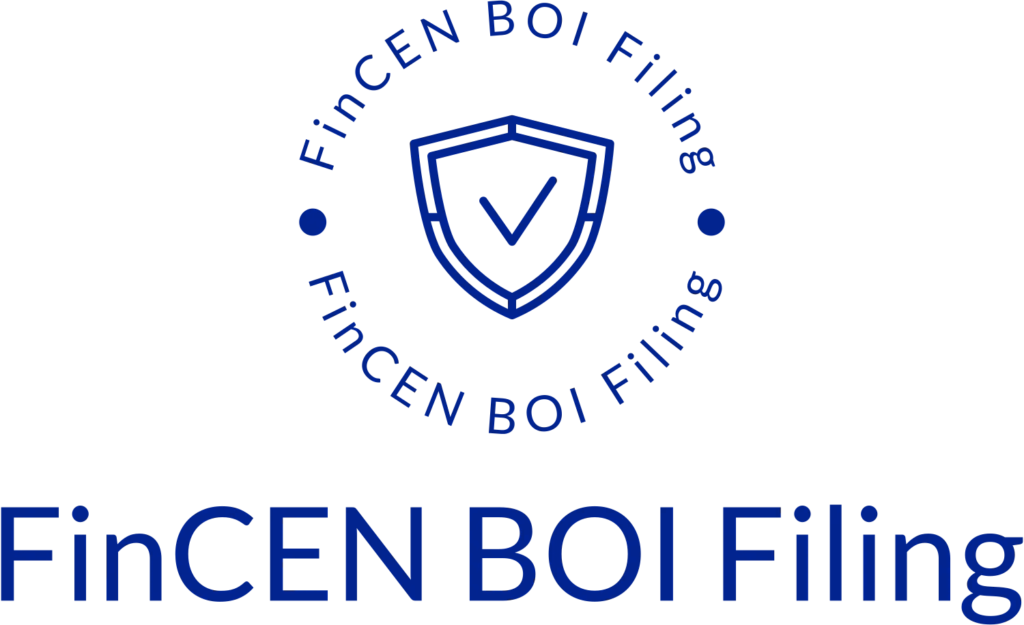Key Takeaways:
- Mandatory Reporting for Single-Member LLCs: The CTA mandates that single-member LLCs generally need to file a BOI report, disclosing beneficial ownership information to FinCEN. This requirement ensures transparency and combats illicit activities, answering the question, “Do single-member LLCs need to file a BOI report?”
- Required Information: Single-member LLC owners must report detailed company information, beneficial owner details, and applicant information. This comprehensive reporting helps prevent the misuse of business structures and financial activities.
- Importance of Timely Compliance: Single-member LLCs must meet BOI reporting deadlines to avoid penalties. Existing LLCs formed before January 1, 2024, must file by January 1, 2025, while new LLCs have 30 days from formation or registration. Staying informed and using tools like our FinCEN BOI Quiz and Filing form ensures accurate and secure reporting, maintaining compliance with the CTA.
As the Corporate Transparency Act (CTA) takes effect, many small business owners wonder about their reporting obligations. One common question is, “Do single-member LLCs need to file a BOI report?” This article will explore this topic and clarify the requirements for single-member LLCs under the CTA.
What is a BOI Report?
Before addressing the main question, let’s clarify a BOI report. BOI stands for Beneficial Ownership Information. The CTA requires certain entities to file reports disclosing information about their beneficial owners to the Financial Crimes Enforcement Network (FinCEN).
What is a Single-Member LLC?
A single-member LLC, or SMLLC, is a business structure that combines a sole proprietorship’s simplicity with a corporation’s liability protection. As an independent contractor or entrepreneur, you’d choose an SMLLC to separate your personal assets from your business liabilities, reducing your risk if things go south. It’s a straightforward way to protect yourself while maintaining the flexibility to run your business your way.
Do Single-Member LLCs Need to File a BOI Report? The Short Answer: Yes
To answer the question directly: Yes, single-member LLCs generally need to file a BOI report. The CTA applies to most domestic entities created by filing with a secretary of state or similar office and foreign entities registered to do business in the United States. This includes single-member LLCs, regardless of their size or revenue.
While forming a single-member LLC provides the benefit of obscuring ownership from the public through strategies like using registered agents, it’s crucial to remember that you still need to file a beneficial ownership information report. This report must disclose the true owners and key individuals behind the LLC to government authorities, ensuring compliance with legal and regulatory requirements. Despite the privacy protections offered by an LLC, transparency in ownership remains necessary to meet reporting obligations and avoid potential legal issues.

The diagram above illustrates the different requirements for Brad and Jessica based on their business structures. Brad is an independent contractor working directly with Bedrock Incorporated. Since he operates as an individual rather than a formal business entity, he is not subject to Beneficial Ownership Information Report (BOIR) requirements.
In contrast, Jessica has established an LLC that contracts directly with Bedrock. As an LLC, Jessica’s business entity must file a BOIR to disclose ownership details to the government. This requirement ensures transparency regarding the individuals who own or control the LLC, even when only one person controls or owns it.
Why Single-Member LLCs Are Included
The CTA aims to enhance transparency and combat illicit activities such as money laundering and tax evasion. Single-member LLCs are included in the reporting requirements because, like larger entities, they can potentially obscure ownership and financial activities.
What Information Needs to Be Reported?
If you’re a single-member LLC owner, you’ll need to report the following information:
- Company Information: Legal name, any trade names, address, jurisdiction of formation, and taxpayer identification number.
- Beneficial Owner Information: Your full legal name, date of birth, current address, and a unique identifying number from an acceptable document (e.g., driver’s license or passport).
- Company Applicant Information: Details about the individual who filed the documents that created the entity or first registered it to do business in the U.S.
Exceptions to the Rule
While most single-member LLCs must file a BOI report, some exceptions exist. For example, you may not need to file if your LLC falls under one of the 23 exempt entity categories outlined in the CTA. These exemptions typically apply to heavily regulated entities or those reporting similar information to government agencies.
Protecting Your Privacy: Keeping Business Ownership Confidential Despite BOIR Filing
Even though filing a BOIR requires disclosing the owner’s information to the government, keeping your business activities private from the general public is still possible. Using registered agents to handle and file your business documents is an effective strategy for achieving this. By employing a registered agent, you can protect your personal details and maintain compliance with regulatory requirements without exposing your ownership to public view.
From experience, we’ve found that Northwest Registered Agent excels in providing this service at an unbeatable price. They offer comprehensive support for creating and managing LLC filings, ensuring that your ownership remains confidential while handling all necessary paperwork efficiently. This way, you can focus on growing your business without worrying about public exposure.
Deadlines for Filing
The deadline for filing your BOIR depends on when your LLC was formed:
- Existing single-member LLCs formed before January 1, 2024: The deadline to file the initial BOI report is January 1, 2025.
- New LLCs formed on or after January 1, 2024: Report must be filed within 30 days of formation or registration.
Consequences of Non-Compliance
Failing to file a BOI report when required can result in significant penalties, including fines of up to $10,000 and potential imprisonment for up to two years. It’s crucial to take these obligations seriously and ensure timely compliance.
Ensuring Compliance: BOI Reporting for Single-Member LLCs
As the Corporate Transparency Act (CTA) comes into effect, single-member LLC owners must understand their reporting obligations. The key question, “Do single-member LLCs need to file a BOI report?” has a straightforward answer: Yes. Single-member LLCs must comply with the CTA’s requirements to ensure transparency and combat illicit activities. By filing a Beneficial Ownership Information (BOI) report, single-member LLCs can meet these legal obligations and avoid significant penalties.
Ensuring compliance is paramount as you navigate the requirements under the Corporate Transparency Act (CTA). If you’re uncertain about whether your company has a BOI reporting obligation, take advantage of our FinCEN BOI Quiz. This tool will help clarify your obligations swiftly and efficiently. Once you’ve determined your filing status, streamline the process by using our user-friendly FinCEN BOI Filing form. This ensures your BOI report is submitted securely and accurately, maintaining transparency while avoiding potential penalties. Stay proactive and compliant with our trusted tools today.
Frequently Asked Questions
Have questions about the Beneficial Ownership Filing process? Check out FinCEN BOI Filing's frequently asked questions for the answer.
What is a BOI report?
A Beneficial Ownership Information (BOI) report is a filing required by FinCEN to disclose key details about individuals who own or control a company, ensuring compliance with anti-money laundering laws and enhancing corporate transparency. Filing a BOI takes 5-10 minutes and can be done here.
When does the CTA become effective?
The Corporate Transparency Act (CTA) reporting requirements take effect on January 1, 2024. Business entities established before this date have until January 1, 2025, to meet the reporting obligations.
Are there penalties for not filing a BOI report?
Yes, failing to file a BOI report can result in substantial penalties, including hefty fines and potential legal repercussions. Learn more about the BOI deadlines and non-filing BOI penalties.
How do I file a BOI report?
Filing a BOI takes about 5-10 minutes and can be done here. If you’re not sure if you are required to file, you can take the one minute BOI Eligibility Quiz.
Who is considered a beneficial owner?
A beneficial owner is any individual who either:
- Directly or indirectly exercises substantial control over the reporting company, or
- Directly or indirectly owns or controls 25% or more of the company’s ownership interests.
Substantial control includes the power to direct, influence, or determine significant decisions of the company. This may involve senior officers or individuals with authority to appoint or remove senior officers or a majority of the board.
Ownership interests encompass rights that establish ownership in the company, ranging from basic stock shares to more complex financial instruments.
For more details on “substantial control” and “ownership interests,” refer to our guide on complex ownership structures.
How do BOI reports get submitted to FinCEN?
We submit reports through a secure API connection directly with FinCEN’s Beneficial Ownership Secure System (BOSS). This integration allows for seamless and efficient filing of Beneficial Ownership Information reports, reducing the time it takes to complete and submit a report.
Our user-friendly form is designed to minimize errors by guiding you through the process with clear prompts and checks. Additionally, by using the secure API connection, we ensure that your data remains private and protected throughout the submission process, adhering to the highest security standards.
Who can access the beneficial ownership information?
The beneficial ownership information will be accessible only to authorized government agencies, such as law enforcement and regulatory authorities, for the purpose of combating money laundering, fraud, and other financial crimes.
This data is not publicly available and is used solely for compliance with legal and regulatory requirements. Only those with a legitimate need, as defined by the law, will be able to access this information to ensure transparency and uphold national security.
You can read more about keeping your personal information private when filing your BOIR.
Do I need to file a BOIR annually?
No, you do not need to file a Beneficial Ownership Information Report (BOIR) annually. However, you are required to update and file a new report if there are any changes to the beneficial ownership or company applicant information, such as changes in ownership or control. The report must be filed when there are material updates, but there is no annual filing requirement unless changes occur.
What information is required in a BOI report?
Type of Report
The reporting company must specify the type of report being submitted: an initial report, a correction of a prior report, or an update to a prior report.
Company Information
The reporting company must provide the following details:
- Legal Name: The official name of the company.
- Trade Name: Any “doing business as” (DBA) names used by the company.
- Address: The current street address of its principal place of business. If the principal place of business is outside the U.S., the company must report the address from which it conducts business in the U.S.
- Taxpayer Identification Number (TIN): This includes an EIN, SSN, or ITIN, as appropriate.
Beneficial Owner Information
The reporting company must provide the following details for each beneficial owner:
- Legal Name: The individual’s full legal name.
- Date of Birth: The individual’s date of birth.
- Address: The individual’s residential street address.
- Identification Document: A unique identifying number from an acceptable identification document, the issuing state or jurisdiction, and an image of the document.
Company Applicant Information (if required)
For reporting companies created on or after January 1, 2024, the following information about the company applicant must be provided:
- Address: The individual’s residential street address. If the applicant forms or registers companies as part of their business (e.g., paralegals), the business address can be used. The address does not need to be in the U.S.
- Identification Document: A unique identifying number from an acceptable identification document, the issuing state or jurisdiction, and an image of the document.
Who needs to file a BOI report?
Most businesses are required to file a BOI report, with exceptions for 23 specific categories, such as publicly traded companies and other regulated entities. To learn more about these exemptions and determine if your business needs to file, read this article.
When is the BOI report due?
- Companies formed or registered before January 1, 2024, must file an initial BOI report by January 1, 2025.
- Companies formed or registered in 2024 must file a BOI report within 90 days of receiving actual or public notice of their formation or registration.
- Companies formed or registered on or after January 1, 2025, must file their initial BOI report within 30 days of receiving actual or public notice.
You can learn more about the BOI deadlines here.
What is type of ID is required?
Acceptable identification documents include the following:
- A valid, unexpired driver’s license issued by a U.S. state or territory.
- A valid, unexpired ID card issued by a U.S. state, local government, or Indian Tribe for identification purposes.
- A valid, unexpired passport issued by the U.S. government.
- If none of the above is available, a valid, unexpired passport issued by a foreign government may be used instead.
An identification document must be collected for each beneficial owner.
For companies formed after 2023, an ID must also be provided for the company applicant.
Who is a company applicant?
A company applicant is the individual responsible for creating or registering a company. Specifically, it includes:
- The individual who directly files the document to form or register the entity with the relevant state or tribal authority, such as the Secretary of State.
- The individual primarily responsible for directing or controlling the filing process, even if they are not the one submitting it.
For companies formed or registered after January 1, 2024, this information must be reported as part of the Beneficial Ownership Information Report (BOIR).
Is it necessary to use a certified public accountant (CPA) or other professional to submit a BOI report?
Most individuals will be able to submit their Beneficial Ownership Information reports directly without needing assistance from attorneys or CPAs. Our streamlined, user-friendly form guides you through the process, making it simple to provide the required information accurately and efficiently.
Is a company required to update and correct information that is no longer accurate?
Yes, a company is required to update or correct its beneficial ownership information whenever it is no longer accurate. If there are any changes to the company’s beneficial owners or company applicant information, such as a change in ownership percentages or control, the company must file an updated report with the correct details. This ensures that the information on record remains accurate and compliant with the reporting requirements, helping to maintain transparency and reduce the risk of misuse.
Will I receive a confirmation of submission after submitting the BOIR?
After submitting your BOIR through our website, you will receive an email containing a unique submission process ID, confirming that your submission has been successfully received.
The email will also notify you once FinCEN has accepted your report. In rare instances, if your submission is rejected, we will inform you of the reason and provide a link to resubmit the corrected information.
You can track the status of all your submissions through our BOIR tracking page, ensuring you stay updated on the progress of your report. Most submission have a confirmed acceptance within a few minutes of submission.





